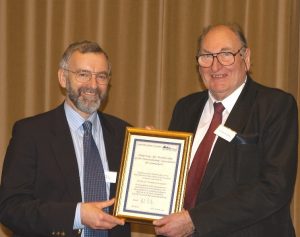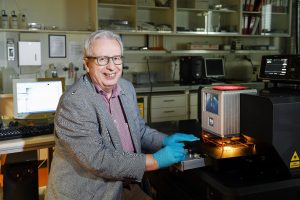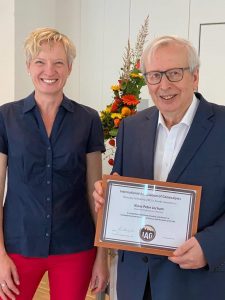Very rarely, the IAG bestows its most prestigious award of Honorary Fellowship on scientists of great distinction, recognizing the huge contribution they have made to geoanalytical science over a lifetime.

Our first such award was made in 2004 to Professor Stanley Greenfield for his pioneering work in the 1960s on the development of the inductively coupled plasma (ICP) as a spectroscopic source.
Since then, Professor Mike Thompson (in 2008), Dr Henry Longerich (in 2015) and Professor Jon Woodhead (in 2018) have all been awarded an IAG Honorary Fellowship for their outstanding contributions to geoanalysis.

The latest addition to this list of luminaries is Dr Klaus Peter Jochum from the Max Planck Institute for Chemistry, Mainz, Germany in recognition of his distinguished and enormous contribution in several areas of geoanalytical science over decades.
Klaus Peter joined the Max Planck Institute for his Diploma thesis in 1966 and became a staff member in 1972, before being awarded his PhD in 1973. His research interests include studies related to cosmochemistry, geochemistry, biogeochemistry and climate geochemistry. In the laboratory, his aim was always to devise ways of improving analytical methods so that the most appropriate solution is found to solve a specific research problem.
He is still a very prolific and highly cited scientist, having published over 250 papers. From the beginning of his career, Klaus Peter has been engaged on developing analytical methods centred around the application of mass spectrometry to geological materials. At the beginning, these involved elemental analysis by spark source mass spectrometry (SSMS) before moving to laser ablation ICP-MS. As he was always keen on in situ analysis, he developed an automated Ir-strip heater to facilitate the melting of small amounts of rock powder in the preparation of glass beads for whole rock analysis by LA-ICP-MS. His numerous publications on ns-LA-ICP-MS and fs-LA-ICP-MS reflect his passion for LA-ICP-MS applications.
As well as implementing new analytical methods, one of his most significant achievements was the development of the GeoReM database, which was launched in 2005. This includes data on more than 3780 geological and environmental reference materials and is an invaluable a source of information for many geoanalysts. The MPI-DING reference glasses were developed under his direction and have been made available to laboratories worldwide to act as reference samples in microanalytical investigations of a wide variety of materials.
Over his long career, he established worldwide co-operations with researchers from other disciplines including biology, chemistry, archaeology and environmental sciences. Some of these became close friends. Moreover, Klaus Peter always felt it was crucial to encourage and support young scientists at the start of their career. Many of the PhD and postdoctoral students that he mentored have now become successful researchers in their field of science.

On 29 September 2021, we held an official ceremony at which we presented Dr Klaus Peter Jochum with his Honorary Fellowship of the IAG. Professional colleagues joined him at the Max Planck Institute (MPI) in Mainz, Germany and by video link to celebrate his scientific achievements and support for the IAG over many years. In the words of the IAG President, Prof Jacinta Enzweiler, “Dr Jochum’s many years of research in the field of geoanalytical method development and reference materials, as well as his commitment to the promotion of junior scientists, aligns perfectly with the tasks and goals of the IAG”.
You can read more about this splendid occasion and Dr Jochum’s career in a MPI press release at https://www.mpic.de/5042527/honorary-fellowship-jochum
